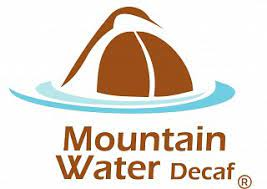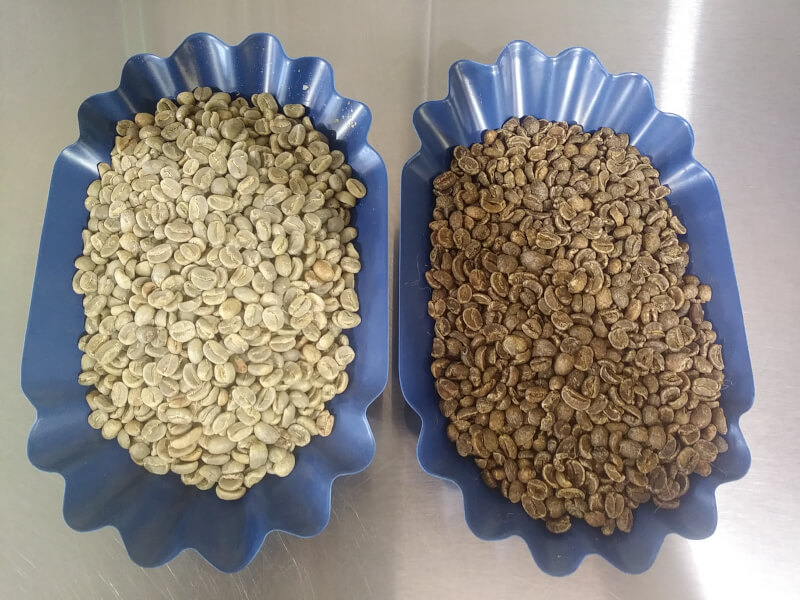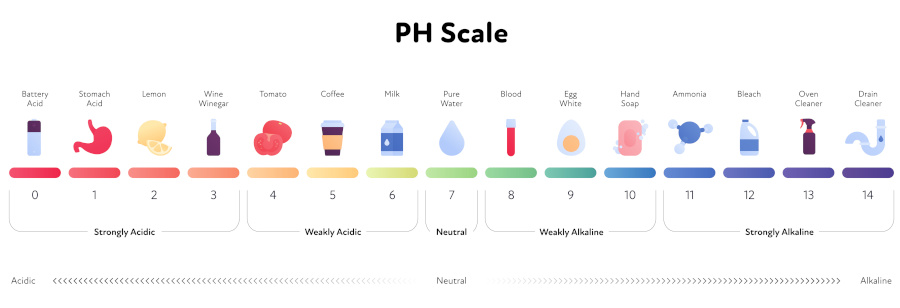
Low Acid Decaf Coffee
Decaf Low Acid Coffee
The world of decaf coffee can be confusing. The purpose of the article is to help you navigate the pitfalls and platitudes buzzing on the internet today about decaf low acid coffee.
This is not about providing a list of decaf low acid coffee brands from a blogger seeking an Amazon affiliate commission, who has never roasted a coffee bean in his life trying to get you to buy a coffee off his list.
Rather this is about given you, the consumer, the information and the tools to achieve your goal. To find a great tasting decaf low acid coffee that works for you. When you finish this article, you will know about:
- Why you might want to avoid caffeine?
- Which decaf processing method to choose?
- Which type of coffee bean to choose?
- Which type of roasting method is best to choose?
- How to determine if a coffee is truly low acid coffee?
This is important because we are not just talking about money, it's really about your health.
Let's begin! So what is low acid decaf coffee anyway? It's coffee that is low in chlorogenic acid and has also been decaffeinated. For more explanation on the specifics of low acid coffee beans see my article what is low acid coffee. Now, lets talk about caffeine.
Caffeinated Coffee and GERD, IBS, and Other Maladies
Much has been written about caffeine with both positive and negative impacts on health. While caffeine can be a great stimulant, focus concentration, and boost your immune system to name just a few positive attributes of caffeine, it can also have a negative impact on certain peoples physiology, including those suffering from various medical conditions such as, irritable bowel syndrome (IBS) gastroesophageal reflux disease (GERD) and others that experience unpleasant side effects and symptoms like upset stomach, caffeine can be something to avoid.
As a result, in some cases low acid coffees are not enough, because caffeine can also cause a problem for people with sensitive stomachs. Some people must drink coffee that is caffeine free and low acidity. But what type of decaf should you buy?
Methods of Decaffeination
This is important to know. There are a number of ways to decaffeinate coffee beans from solvents to water based methods. There are even processing techniques that use a liquified CO2 to decaffeinate coffee. To learn more about how the decaf process works read my post decaf swiss or mountain water which is best.
Solvent Based Decaffeination Methods
Methyl Chloride and Ethyl Acetate are solvents used widely in the coffee industry to remove caffeine from green (unroasted) coffee beans. Here are a few things to consider.
Methyl Chloride
The Methyl Chloride (MC) decaffeination process involves using (CH3Cl) also known as the chloromethane to remove caffeine from the coffee beans. MC in large quantities is harmful to humans.
- This process is about 94% effective.
- By the inherent nature of processing, MC decafs will never be organic.
- MC decafs have a residual processed flavor.
- In large quantities, MC is harmful to humans.
Ethyl Acetate
Ethyl Acetate (E.A.) – Is a naturally occurring ester that is used as a solvent to bond and remove caffeine from the green coffee bean. EA is used as a bonding agent to extract caffeine from green coffee during the decaffeination process.
- Process is about 97% effective
- E.A decafs have a residual processed flavor.
- In large quantities, E.A. is harmful to humans.
Water Based Decaffeination Methods
A great alternative to solvent based decaffeination methods are the increasingly popular water processed decaffeination methods; Swiss Water and Mountain Water.
Swiss Water Processed
Swiss Water Processed (SWP) is a water based decaf method that uses water to extract the caffeine. This process is chemical free and does not use solvents like MC or EA.
- Process is 99% effective
- SWP does not solvent residual flavors
- Can be certified organic.
- SWP is not harmful to humans.

Mountain Water Processed
Mountain Water Processed (MWP) is also a water based method of decaffeination, similar to SWP in that water is the active agent to bond to the caffeine prior to removal, and no dangerous chemicals are used to remove caffeine.
- Process is 99.96% effective.
- MWP does not have solvent residual flavors.
- Can be certified organic.
- MWP is not harmful to humans.

What About Residual Caffeine?
While a coffee can be have low acidity and be water processed decaffeinated, the residual caffeine can also present a problem for coffee drinkers. Residual caffeine is the caffeine left on the bean after decaffeination. Both Swiss Water and Mountain decaf coffee typically leave less than 1% of caffeine.
In the case of Mountain Water decafs, residual caffeine is .004% . A near trace amount. That is highly effective at reducing caffeine levels.
Can It Be Organic?
MC and EA decaf coffees will never be organic because of the inherent nature of the decaffeination process. However, SWP and MWP decafs are sold as both conventional and organic coffee. Avoid the chemicals and strive for a more natural coffee. A water based decaf coffee is your best choice.
Coffee Bean Quality
Because MC and EA decaf methods are tainted with "chemical" or "processed" aftertastes, lower quality coffee as graded by the Specialty Coffee Associations of America (SCAA) standards scores in the lows 70's (not good). On the other hand, specialty coffee grade coffees with SCAA scores in the 80's can be used for water processed decafs, SWP and MWP, which have a more neutral impact on flavor.
It's simple, companies would not waste good coffee using it with MC or EA because the decaf method ruins the flavor, whereas good scoring specialty grade coffees are used for water decaf processing and even organic coffee can be used because water based decaffeination is more neural on flavor..
SWP and MWP or mostly all Arabica beans, which are preferable to Robusta beans in flavor and quality. Interestingly, Arabica beans have less organic acid compounds such as quinic acid, chlorogenic acid, and acetic acids. Arabica coffee is always the better choice for flavor, and have reduced acid content of the two coffee beans grown.
What Are The Sources Of Acid In Coffee?
The primary sources of acidity in coffee are organic compounds such as Chlorogenic acid, Malic acid, Citric acid, Quinic acid, and Phosphoric acid. While not as prevalent as in Robusta coffee beans, these acidic compounds are inherent in arabica beans. Keep in mind even Arabica coffee is still among one of many acidic foods.
Other Sources Of Acid In Coffee
Yes, there other organic sources of acidity in coffee that occur naturally, but their contribution to the overall pH of the cup would be negligible.
Slow Roasting Decaf
Many coffee roasters approach low acid coffee differently. Some try to achieve results by using only dark roasts or by treatments to the beans prior to roasting.
Over the last 40 years much has been written by scientists in Food Science Journals about coffee and its acidity and the effects of roasting on the coffee beans. According to all the journals that I have read, the single most effective means to greatly impact coffee acidity is by time and temperature during the roast.
It's called slow roasting. Slow roasting coffee is the most effective means to affect coffee acidity naturally. Slow roasting involves roasting coffee for a longer duration at higher temperatures. Managing time and temperature is the most effective way to reduce acidity in coffee, it also is the most natural among low acid coffees available.
There are no special treatments the beans undergo. It is a simple natural process. In fact, most coffee throughout history has been roasted in a similar fashion. My advice is to avoid treated low acid coffees. The whole process is less natural, less effective, and negatively impacts the taste.
Great Flavor
The flavor of slow roasted decaf and low acid coffee beans will surprise you. As I mentioned, water processing low acid coffee beans is neutral on the flavor. When slow roasted, unless you are told otherwise, for most coffee lovers, you probably can't tell the difference between regular or decaf coffee.
The slow roast flavor profile is more effective at achieving a better cup of coffee. Lighter roast or darker roast, slow roasted coffee will give a natural rich flavor, that is less acidic, and a less bright coffee, without the bitterness. Great news for people with stomach acid issues like acid reflux. Because the coffee will have a very mild acidity, its works well for people with sensitive stomachs and those that enjoy a smooth coffee.
How To Choose Great Decaf Low-Acid Coffee?
Know the pH of the coffee. The pH level or pH score as I like to call it is an objective measure of the coffees acidic content on the pH scale. This is not a subjective measurement such as what's the best restaurant or the best movie. The pH level,is objectively measured on a pH scale and not subject to whim or a person's predilections.

Does the roaster know the pH of the coffee they are selling you? Since there is no universal standard, anything can be sold as low acid coffee. If the roaster gives you a score, is it 3rd party verified by an independent lab? Is the laboratory analytic report posted? Be careful if the roaster is not transparent.
So lets review. Here is the information I promised to give you.
Which Decaf Processing Method to Choose?
Answer: Water Based Decaf. It's chemicals free and tastes better.
Which Type of Coffee Bean to Choose:
Answer: Arabica coffee has lower acidity than Robusta coffee.
Which Type of Roasting Method is Best to Choose.
Answer: Slow roasting achieves the temperature and duration identified by scientists in Food Science Journals and peer reviewed publications to maximally reduce acidity. It's an all natural process with no treatments.
How to Determine if a Coffee is Truly Low Acid Coffee.
Answer: Use the pH score as a method to evaluate the coffees acidity.
I hope that was helpful to you. I have been in the coffee industry for nearly 20 years and enjoy sharing information with people that are interested and can benefit from it. One last thing I would ask you to consider is Mavericks Coffee.
Low Acid Decaf
At Mavericks, for decafs we only use Mountain water processed decafs. Those decafs are made with 100% organic ingredients. After the beans are water processed and sent to us, we slow roast them. Our roast profiles far exceed those of the Food Science Journals and are also developed to not only deliver a very low acid coffee, but also a coffee that is enjoyable to drink.
The slow roast process dramatically reduces the Chlorogenic acid levels making the coffee low acid and also produces a coffee that is balanced, smooth and has a more natural flavor with less bright and a less acidic coffee taste.
Mavericks decafs are 99.994% caffeine free and are low in acid, made with 100% organic coffee and taste great. For transparency, all of our organic certifications and our 3rd party Independent Laboratory analytical reports are posted on our certifications and analytics page. Plus, each coffee will also have a badge telling you the percentage reduction in acidity.
Enjoy complex flavors with our singe origin or our signature coffee blends. You will get a superb coffee without the acidic taste.
Lastly, I will pay for the shipping. Enter decafshipfree at checkout.
Please, try one today, I think you will enjoy drinking them.
-Ryan
FAQ
What coffee has the least caffeine and acid?
Mavericks Coffee Decaf Dark French Blend, has the least amount of acid with a pH 6.39 and a residual caffeine amount of 0.04%.
Is there a decaf acid free coffee?
No. All coffee will have acidity. In fact, coffee is full of acids such as; Chlorogenic acid (CGA), Malic acid, Citric acid, Quinic acid, and Phosphoric acid. However, it's diminishing one particular acid compound CGA-5 that transforms the coffee into a lower acidity coffee.
Is decaffeinated coffee OK for acid reflux?
The decaffeination process removes caffeine from coffee beans, but does not remove the acid. While caffeine can be an irritant to acid reflux sufferers, coffees acidity typically is the bigger problem. Don't just buy a decaf, make sure to get a less acidic coffee.
Can coffee brewing affect the acidity?
Yes, cold brewing coffee can have an impact on acid content. Cold brew coffee can also have great flavor, but it is not a substitute for a truly low acid coffee. Plus, cold brew still has caffeine.
What about dark roast coffee?
Dark roast coffee can impact coffee acidity and make coffee have less acid. However, just because its a dark roast coffee does make it a low acid coffee. A low acid coffee is low acid because it is truly low in acid not because someone roasts a bean darker than another bean. For example, when slow roasting because of the time and temperature, light roasts can have far less acid then a dark roast. Let's not forget that regardless of roast, it has no real effect on caffeine.
What coffee is OK for acid reflux?
While most truly low acid coffee can work for people with various conditions including acid reflux, we must remember, each person's own medical situation is different. It might not be just the acid but the caffeine as well.
People suffering from various philological sensitivities to coffee, must give themselves the best chance to have success. The coffee should have a pH 5.5 score of higher, be slow roasted for taste and acidity, and if caffeine is an issue, the coffee should be water based decaffeinated.
5 comments
-
DOES YOUR COFFEE BEAN DECAF LOW ACID HAVE ANY NUTS OR CHOCOLATE IN THE COFFEE GROUND.
-
What size grind does the decaf, acid free have.
-
What size grind does the decaf, acid free have.
-
Have any questions about decaf? Please leave a comment below.
Ryan
Hi Carol: There are no nuts or chocolates ground in with the coffee. There are just hundreds of flavor notes that you can get from a coffee bean. While we see it might have a nutty finish, we mean it resembles that taste on your palate.